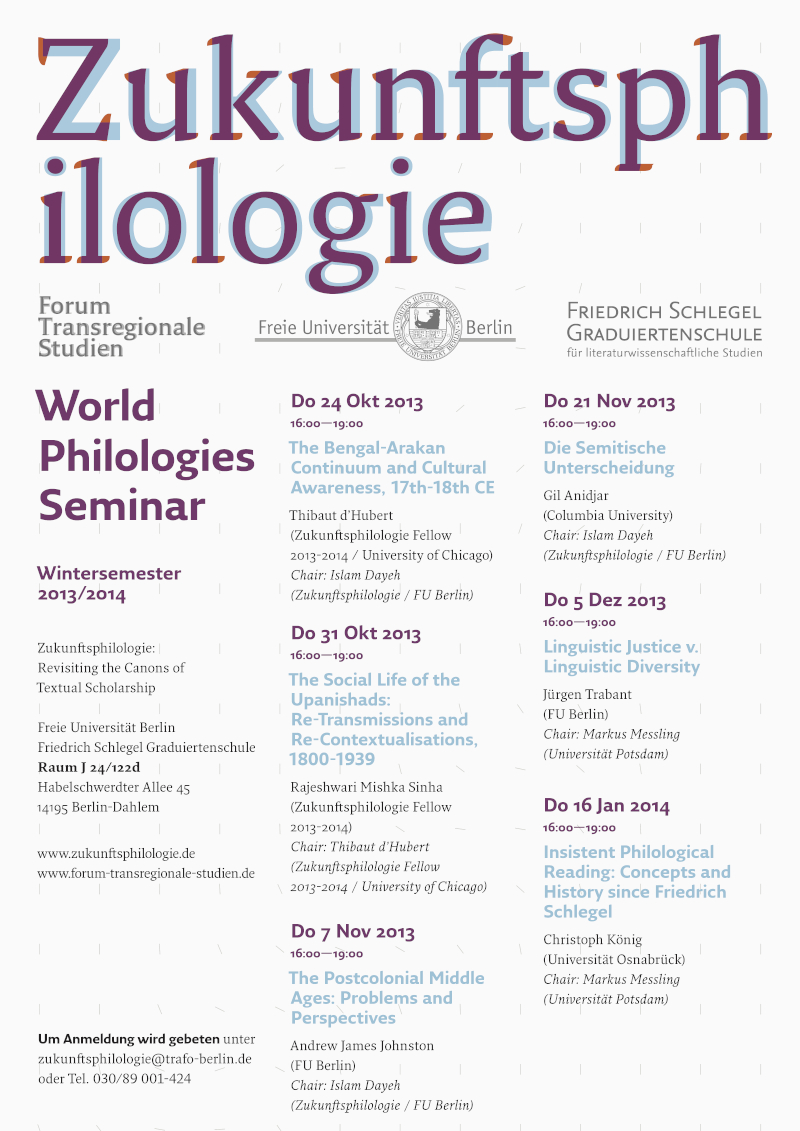The frontier region between today''s Bangladesh and Myanmar is the meeting point of what post-WWII scholarship defined as South, Southeast and East Asia. It was and still is a region of intense circulation of people, goods and ideas. Recently, historians highlighted the political unity of this frontier-area during the early modern period (c. 15th-18th CE) with the formation of the kingdom of Arakan. The kingdom thrived on its status of frontier-area. This historical moment was the cradle of a cultural ethos that was expressed in a variety of artistic and literary productions which, for reasons we will examine, gradually became strange to the eyes of the inhabitants of the region and that were largely neglected by the scholarly community.
I propose to present a synthesis of the work I have done so far on the Bengali court poetry produced in Arakan in the 17th century CE and to explain how this led me to a new, and seemingly very different, project on a corpus of religious, historical and scientific texts in Persian written on the eve of the colonial period. In the first part of the workshop, I will provide a general overview of this domain of investigation and discuss the perception of the Bengal-Arakan continuum from the early modern period onward. I will then give an ''updated'' account of the cultural history of this region based on studies made during the last two decades.
The Bengal-Arakan Continuum and Cultural Awareness, 17th-18th CE
Thibaut d'Hubert (Zukunftsphilologie Fellow 2013-2014/University of Chicago); Chair: Islam Dayeh (Freie Universität Berlin)
Freie Universität Berlin, Raum J24/122d, Habelschwerdter Allee 45, 14195 Berlin

In the second part of the workshop, we will look at a series of excerpts taken from Bengali and Persian texts illustrating the translation of an Islamic aesthetic and religious idiom into an Indic one, and vice versa, performed by the Muslim literati of Arakan in the 17th and 18th centuries CE. We will observe the choices made by the authors in light of the ultimate functions of the texts and their relevance to the contemporary audience. We shall see that the contexts of composition of those texts differ greatly from one another. On the other hand, one could argue that despite the contrasted purposes of their authors and commissioners, these texts manifest a common cultural ethos fashioned in the kingdom of Arakan. How exactly did this religious and literary culture come into existence? What were the curricula that allowed such multilingual literacy? How can the study of those texts inform contemporary reflections on cultural awareness in the early modern period? These are some of the questions we will raise as we will be taking a closer look at this corpus.
Seminar Text:
Thibaut d’Hubert completed his PhD at the Historical and Philological Sciences section of the École Pratique des Hautes Études in Paris in 2010 and then joined the department of South Asian Literatures and Civilizations of the University of Chicago. His research focuses on premodern literary cultures in Bengal, with a special emphasis on translations involving Bengali and Persian. In the framework of the program, Thibaut explores the archive of John Murray MacGregor (1745-1822), a Scottish officer who was instrumental in the foundation of learned societies in England, Scotland and Bengal in the late 18th century. The interpretation of this archive entails a twofold project. The first part is the reconstitution of Murray’s biography based on his English, Persian and Bengali correspondence. The second part looks at Persian translations of Buddhist texts from Arakan (in modern Myanmar) commissioned by Murray. Thibaut studies the cultural layers visible in the process of translation of the Buddhist texts by Murray’s secretaries ‘Azīz Allāh Bukhārī and Ṣādiq ʿAlī. The project as a whole explores the paths linking textual practices and scholarly traditions from Burma to Scotland on the eve of colonialism.

